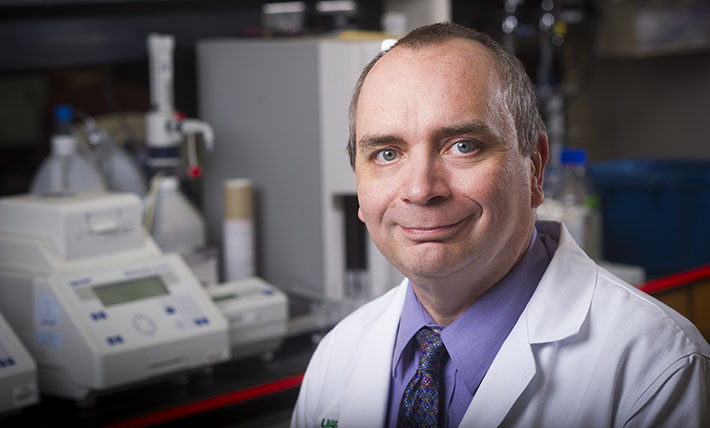 Alzheimer’s disease affects millions of Americans and is the nation’s sixth leading cause of death. Alzheimer’s is marked by the accelerating death of brain cells, which means early detection is critical, says David Geldmacher, M.D., director of the UAB Division of Memory Disorders and Behavioral Neurology and Patsy W. and Charles A. Collat Endowed Professor in Neuroscience. Geldmacher, an expert on Alzheimer’s diagnosis and management, shares his latest research and reveals some common myths about the disease.
Alzheimer’s disease affects millions of Americans and is the nation’s sixth leading cause of death. Alzheimer’s is marked by the accelerating death of brain cells, which means early detection is critical, says David Geldmacher, M.D., director of the UAB Division of Memory Disorders and Behavioral Neurology and Patsy W. and Charles A. Collat Endowed Professor in Neuroscience. Geldmacher, an expert on Alzheimer’s diagnosis and management, shares his latest research and reveals some common myths about the disease.
UAB Magazine: Why is your research focused on the earliest stages of Alzheimer’s disease?
Geldmacher: We haven’t discovered a way to effectively make brain cells grow back. Once they’re lost, they’re gone forever. We need to intervene earlier, at the point when brain damage can be minimized. With modern technology, we can recognize biological changes in the brain before disabling levels of memory loss occur.
UAB Magazine: What potential therapies are you testing in your lab?
Geldmacher: We know one of the crucial features of Alzheimer’s is the abnormal accumulation of a normal protein called the amyloid peptide. Many of our treatments target that peptide. We look at medications that can prevent amyloid from forming, or that try to remove it once it has formed. We also look at medications that try to lessen amyloid’s toxic effects on brain cells. And we are testing medications that can potentially help affected brain cells work better or resist amyloid’s toxic effects.
UAB Magazine: One of your goals is to boost the amount of clinical research in Alzheimer’s. Why is this so important?
Geldmacher: Without a placebo-controlled trial, no new medicine can come to market. This is the bridge from the research labs to the doctor’s office. We need to know the drugs are safe and that they work in people—not just animals. The only way to do that is to test them in people who have volunteered.
UAB Magazine: You are also focused on integrated care for patients with Alzheimer’s. What does that mean?
Geldmacher: The Alzheimer’s disease process leads to less and less independence, and eventually people lose the ability to be mobile. They end up in their chairs or beds because their brains can’t follow through with purposeful mobility. Complications like blood clots in legs can end up causing death. Another common difficulty is people lose the know-how to eat and hydrate themselves.
We frequently find that the care a patient receives gets fragmented across physicians. Neurologists and psychiatrists prescribe medications that affect the patient while a primary care physician is helping to manage their blood pressure or diabetes. It’s difficult to keep patients and doctors in sync even though they’re all dealing with elements of the same illness. Communication is important.
Through the UAB Memory Disorders Clinic, members of our nursing staff can provide support and information. And we have a referral network within the UAB system with neurologists, geriatricians, speech therapists, psychologists, and other relevant specialists who can communicate with each other quickly and effectively. One of our goals is to strengthen the network of health-care providers who can work together to meet patients’ needs. An integrated care team that includes nursing, psychology, social work, and rehabilitation services like speech and occupational therapy can help people with Alzheimer’s disease maintain their highest levels of independence and daily function. I think that these services help maintain the highest possible quality of life for people with Alzheimer’s.
UAB Magazine: Do you find that general practitioners have any misconceptions about Alzheimer’s?
Geldmacher: There is still a common perception that there isn’t much we can do for people with Alzheimer’s. But we’re learning there are things we can do to help people maintain their well being through physical exercise, mental stimulation, and a healthy diet. Those three things may help to prevent the disease or slow it down.
The other misconception is that disabling levels of memory loss are part of the aging process. That’s clearly not true. There’s growing evidence that treatment with our existing medications, such as cholinesterase inhibitors, has a meaningful long-term impact.
UAB Magazine: What do you wish the public knew about Alzheimer’s?
Geldmacher: It’s a biological disease, not a mental illness. It’s not a weakness or the fault of the person who developed it. For the vast majority of cases, we still don’t know what triggers the disease. It appears that there isn’t just one cause, but a series of interactions between genetics, lifestyle, small strokes, and concussions. When people have a certain combination of factors, which might differ from one person to the next,the disease shows up.
This story, written by Robin Sutton Anders and Eleanor Spicer Rice, was originally published by UAB Magazine.